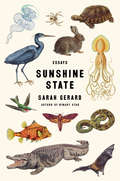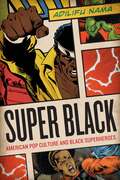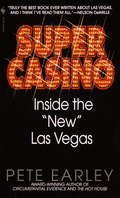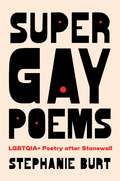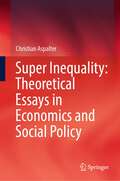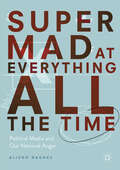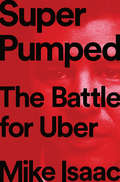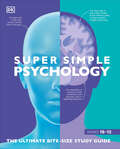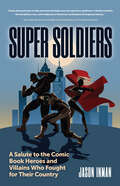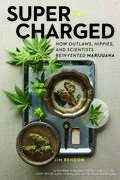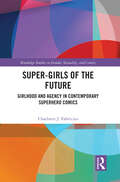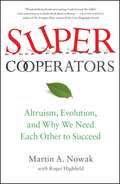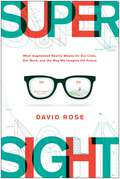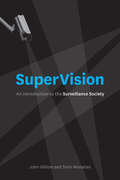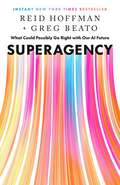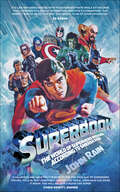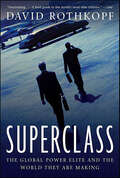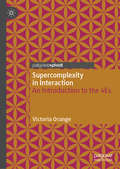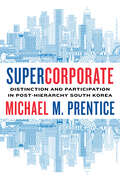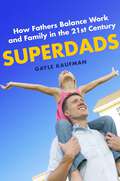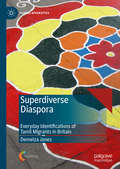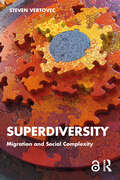- Table View
- List View
Sunshine State: Essays
by Sarah GerardA Chicago Tribune Exciting Book for 2017 • A Buzzfeed Most Exciting Book for 2017 • A The Millions Great 2017 Preview Pick• A Huffington Post 2017 Preview Pick • A PW Spring 2017 Top 10 Pick in Essays & Literary Criticism“Brave, keenly observational, and humanitarian…. Gerard’s collection leaves an indelible impression.” — Publishers Weekly, starred review “These large-hearted, meticulous essays offer an uncanny x-ray of our national psyche... showing us both the grand beauty of our American dreams and the heartbreaking devastation they wreak.” — Garth Greenwell, author of What Belongs to YouSarah Gerard follows her breakout novel, Binary Star, with the dynamic essay collection Sunshine State, which explores Florida as a microcosm of the most pressing economic and environmental perils haunting our society.In the collection’s title essay, Gerard volunteers at the Suncoast Seabird Sanctuary, a world renowned bird refuge. There she meets its founder, who once modeled with a pelican on his arm for a Dewar’s Scotch campaign but has since declined into a pit of fraud and madness. He becomes our embezzling protagonist whose tales about the birds he “rescues” never quite add up. Gerard’s personal stories are no less eerie or poignant: An essay that begins as a look at Gerard’s first relationship becomes a heart-wrenching exploration of acquaintance rape and consent. An account of intimate female friendship pivots midway through, morphing into a meditation on jealousy and class.With the personal insight of The Empathy Exams, the societal exposal of Nickel and Dimed, and the stylistic innovation and intensity of her own break-out debut novel Binary Star, Sarah Gerard’s Sunshine State uses the intimately personal to unearth the deep reservoirs of humanity buried in the corners of our world often hardest to face.
Super Black: American Pop Culture and Black Superheroes
by Adilifu Nama&“A welcome overview of black superheroes and Afrocentric treatments of black-white relations in US superhero comics since the 1960s.&” –ImageTexT JournalWinner, American Book Award, Before Columbus FoundationSuper Black places the appearance of black superheroes alongside broad and sweeping cultural trends in American politics and pop culture, which reveals how black superheroes are not disposable pop products, but rather a fascinating racial phenomenon through which futuristic expressions and fantastic visions of black racial identity and symbolic political meaning are presented. Adilifu Nama sees the value—and finds new avenues for exploring racial identity—in black superheroes who are often dismissed as sidekicks, imitators of established white heroes, or are accused of having no role outside of blaxploitation film contexts.Nama examines seminal black comic book superheroes such as Black Panther, Black Lightning, Storm, Luke Cage, Blade, the Falcon, Nubia, and others, some of whom also appear on the small and large screens, as well as how the imaginary black superhero has come to life in the image of President Barack Obama. Super Black explores how black superheroes are a powerful source of racial meaning, narrative, and imagination in American society that express a myriad of racial assumptions, political perspectives, and fantastic (re)imaginings of black identity. The book also demonstrates how these figures overtly represent or implicitly signify social discourse and accepted wisdom concerning notions of racial reciprocity, equality, forgiveness, and ultimately, racial justice.&“A refreshingly nuanced approach . . . Nama complicates the black superhero by also seeing the ways that they put issues of post-colonialism, race, poverty, and identity struggles front and center.&” –Rain Taxi
Super Black: American Pop Culture and Black Superheroes
by Adilifu Nama&“A welcome overview of black superheroes and Afrocentric treatments of black-white relations in US superhero comics since the 1960s.&” –ImageTexT JournalWinner, American Book Award, Before Columbus FoundationSuper Black places the appearance of black superheroes alongside broad and sweeping cultural trends in American politics and pop culture, which reveals how black superheroes are not disposable pop products, but rather a fascinating racial phenomenon through which futuristic expressions and fantastic visions of black racial identity and symbolic political meaning are presented. Adilifu Nama sees the value—and finds new avenues for exploring racial identity—in black superheroes who are often dismissed as sidekicks, imitators of established white heroes, or are accused of having no role outside of blaxploitation film contexts.Nama examines seminal black comic book superheroes such as Black Panther, Black Lightning, Storm, Luke Cage, Blade, the Falcon, Nubia, and others, some of whom also appear on the small and large screens, as well as how the imaginary black superhero has come to life in the image of President Barack Obama. Super Black explores how black superheroes are a powerful source of racial meaning, narrative, and imagination in American society that express a myriad of racial assumptions, political perspectives, and fantastic (re)imaginings of black identity. The book also demonstrates how these figures overtly represent or implicitly signify social discourse and accepted wisdom concerning notions of racial reciprocity, equality, forgiveness, and ultimately, racial justice.&“A refreshingly nuanced approach . . . Nama complicates the black superhero by also seeing the ways that they put issues of post-colonialism, race, poverty, and identity struggles front and center.&” –Rain Taxi
Super Casino: Inside the "New" Las Vegas
by Pete EarleyIn this lively and probing book, award-winning author Pete Earley traces the extraordinary evolution of Las Vegas -- from the gaudy Mecca of the Rat Pack era to one of the country's top family vacation spots. He revisits the city's checkered history of moguls, mobsters, and entertainers, reveals the real stories of well-known power brokers like Steve Wynn and legends like Howard Hughes and Bugsy Siegel, and offers a fascinating portrait of the life, death, and fantastic rebirth of the Las Vegas Strip. Earley also documents the gripping tale of the entrepreneurs behind the rise and fall and rise again of one of the largest gaming corporations in the nation, Circus Circus -- to which he was given unique access. In his trademark you-are-there style, he takes us behind the scenes to meet the blackjack dealers and hookers, the heavy hitters and bit players, the security officers, cabbies, and showgirls who are caught up in the mercurial pace that pulses at the heart of this astounding city.
Super Gay Poems: LGBTQIA+ Poetry after Stonewall
by Stephanie BurtA major poet and literary critic leads an aesthetic adventure through poems about queer experience, by writers who identify as lesbian, gay, bisexual, queer, trans, nonbinary, gender fluid, and more.A groundbreaking anthology edited by acclaimed poet, critic, and scholar Stephanie Burt, Super Gay Poems brings together fifty-one works encompassing the wide range of queer and trans verse after the Stonewall uprising of 1969. Since that galvanizing moment, poetry has served as both a vehicle for queer liberation and a witness to its sometimes fragile, sometimes ebullient flourishing, across the world.The poems in this anthology represent the great variety of queer and trans life itself. They include near-sonnets, iambic couplets, and rhymed quatrains; skinny dimeters and shaped poems; chatty free verse and intentionally inaccurate translations; the demotic and the rococo. Arranged in chronological order, the selections trace queer culture’s recent evolutions. Frank O’Hara, Audre Lorde, Judy Grahn, James Merrill, Thom Gunn, Jackie Kay, Adrienne Rich, Chen Chen, essa ranapiri, and The Cyborg Jillian Weise—poets widely known and poets who deserve to be—share their alienation, their euphoria, and their encounters with a protean community as it discovers new solidarities and new selves.Each piece is paired with a concise, eye-opening essay in Burt’s trademark style, with verve and an inimitable literary ear. A treasury of aesthetic experience and insight, Super Gay Poems points protestors, political organizers, poetry lovers, and LGBTQIA+ readers toward many beautiful tomorrows.
Super Inequality: Theoretical Essays in Economics and Social Policy
by Christian AspalterThis book bridges the disciplines of micro-economics and social policy in general, and, in particular, behavioral/explanatory social policy and public choice theory, plus Leibenstein’s X-efficiency theory. Being trained as an economist and social policy scientist, the author leaps out of the comfort zone of most social policy scientists and experts, right into the exciting world of micro-economic theory, and then extending and connecting those theories to explain major social, political and economic conundrums of our time. In doing so, the book offers a new set of theoretical—and practical—explanations derived from the general proposition of micro-economic theory, of how government officers, policymakers, administrators and the people themselves alike are, by and large, motivated in their daily as well as strategic (long-term) decision-making. Using a meta-analytical approach (based on a number of grand theories), this book also explains systemic factors behind human behavior and the thereof resulting shortcomings in lifetime outcomes (health, wealth and happiness of a person) and at the same time societal, policy-making, and economic outcomes on societal level, and in global comparison.The outcomes thereof can be measured exactly (and hence validated), especially through the method of empirical comparative social science/economic research. Here, the author also (but not only) introduces the new method of using Aspalter's Standardized Relative Performance (SRP) Index in measuring exactly complex, aggregate performances of multiple governments, and that at the same time also across the entire world.
Super Mad at Everything All the Time: Political Media and Our National Anger
by Alison DagnesSuper Mad at Everything All the Time explores the polarization of American politics through the collapse of the space between politics and culture, as bolstered by omnipresent media. It seeks to explain this perfect storm of money, technology, and partisanship that has created two entirely separate news spheres: a small, enclosed circle for the right wing and a sprawling expanse for everyone else. This leads to two sets of facts, two narratives, and two loudly divergent political sides with extraordinary anger all around. Based on extensive interviews with leading media figures and politicos, this book traces the development of the media machine, giving suggestions on how to restore our national dialogue while defending our right to disagree agreeably.
Super Pumped: The Battle For Uber
by Mike IsaacA New York Times technology correspondent presents the dramatic story of Uber, the Silicon Valley startup at the center of one of the great venture capital power struggles of our time. <P><P>In June 2017, Travis Kalanick, the hard-charging CEO of Uber, was ousted in a boardroom coup that capped a brutal year for the transportation giant. Uber had catapulted to the top of the tech world, yet for many came to symbolize everything wrong with Silicon Valley. <P><P>Award-winning New York Times technology correspondent Mike Isaac’s Super Pumped presents the dramatic rise and fall of Uber, set against an era of rapid upheaval in Silicon Valley. Backed by billions in venture capital dollars and led by a brash and ambitious founder, Uber promised to revolutionize the way we move people and goods through the world. A near instant “unicorn,” Uber seemed poised to take its place next to Amazon, Apple, and Google as a technology giant. <P><P>What followed would become a corporate cautionary tale about the perils of startup culture and a vivid example of how blind worship of startup founders can go wildly wrong. Isaac recounts Uber’s pitched battles with taxi unions and drivers, the company’s toxic internal culture, and the bare-knuckle tactics it devised to overcome obstacles in its quest for dominance. With billions of dollars at stake, Isaac shows how venture capitalists asserted their power and seized control of the startup as it fought its way toward its fateful IPO. <P><P>Based on hundreds of interviews with current and former Uber employees, along with previously unpublished documents, Super Pumped is a page-turning story of ambition and deception, obscene wealth, and bad behavior that explores how blistering technological and financial innovation culminated in one of the most catastrophic twelve-month periods in American corporate history. <P><P><b> A New York Times Bestseller </b>
Super Simple Psychology: The Ultimate Bitesize Study Guide (DK Super Simple)
by DKAccessible to all, this jam-packed psychology study guide has everything students ages 16+ need to help them master this fascinating subject.Super Simple Psychology covers topics ranging from brain anatomy and memory to phobias and addiction, breaking complex information down into manageable, bite-size chunks.Packed with all the core US Advanced Placement, UK A Level, and International Baccalaureate curriculum topics, Super Simple Psychology will help students succeed in the classroom. Each topic is fully illustrated, makes the facts crystal clear and easy-to-understand, and brings the subject to life. Information panels explain and analyze key theories and studies, with the help of simple graphics. A useful "Key facts" box provides a summary that can be used to help with revision.With clear, concise coverage of all the core psychology topics, Super Simple Psychology is the perfect guide for students to support them with classwork and homework, and make studying for exams as stress-free as possible.
Super Soldiers: A Salute to the Comic Book Heroes and Villains Who Fought for Their Country
by Jason InmanA military veteran and comic book expert explores the link between superhero legend and real-life combat in this fascinating book.Comic book superheroes have been influenced by the true heroes of our armed forces for decades. From Captain America punching Hitler in the jaw on his first cover, to The Punisher’s tour of duty in Vietnam, there are countless instances when military history has crossed over to the pages of comic books.A veteran of Operation Iraqi Freedom, author Jason Inman re-discovered his childhood love of comic books during long days at the Tallil Air Base in southern Iraq. He started to wonder about the phenomenon of superhero service members. What kinds of soldiers were these fictional characters? And how were they changed by war?Super Soldiers looks at the intersection between war and pop culture to understand these questions and more. Each chapter revisits military comic book characters and compares them to personal stories from Inman’s military career; describing superhero soldiers from DC comics and Marvel comics, including lesser-known characters lost to time.
Super-Charged: How Outlaws, Hippies, and Scientists Reinvented Marijuana
by Jim RendonMarijuana has been illegal in the United States since 1937. Yet, thanks in large part to a loosely connected underground world of breeders, dealers, and smokers, there are currently more than 2000 varieties available. And since 1996, when California first passed legislation allowing for legalized medical marijuana, the underground has slowly surfaced, pushing what was once a decentralized, lawless world closer to the corporate world of business, agriculture, and pharmaceuticals. Super-Charged gets up close and personal with the people who have transformed this controversial drug. With personalities and backgrounds as diverse as the plant itself, the growers include a former Silicon Valley software entrepreneur; third-generation Humboldt, California, growers; a publicly traded pharmaceutical company; and the famous marijuana personality Jorge Cervantes. Jim Rendon takes readers behind the scenes and into the homes and grow operations of the committed, quality-obsessed practitioners in the international underground industry responsible for creating today's super-charged cannabis. Ironically, these pioneers who built this illegal industry may one day find themselves out of business in the face of the drug's growing mainstream acceptance. Just how this could come about is part of the incredible story.
Super-Food für Wissenshungrige!: Warum wir essen, was wir essen
by Kathrin BurgerVeganismus, Steinzeitkost, Clean Eating – Spezial-Diäten sind beliebt. Ob sie auch gesund sind, erfahren sie in diesem Buch, einer Sammlung aus 27 allgemein verständlichen Beiträgen aus Spektrum der Wissenschaft und spektrum.de . Klar ist, dass nicht zu viele stark verarbeitete Fertigprodukte auf dem Tisch stehen sollten. Doch Ernährung ist viel mehr als die Summe der Inhaltsstoffe in den verzehrten Lebensmitteln. Essen ist ein „kulturelles Totalphänomen“. Das heißt, es spielen psychische sowie gesellschaftliche Faktoren eine große Rolle dabei, was wir essen. Darum essen Männer auch etwas anderes als Frauen, darum unterscheiden sich Speisepläne auf der ganzen Welt und darum werden Ess-Entscheidungen großteils nicht mit dem Verstand sondern mit dem Gefühl getroffen. Genießen Sie also die hier aufgetischten Fakten und stillen Sie Ihren Wissenshunger.
Super-Girls of the Future: Girlhood and Agency in Contemporary Superhero Comics (Routledge Studies in Gender, Sexuality, and Comics)
by Charlotte J. FabriciusSuper-Girls of the Future: Girlhood and Agency in Contemporary Superhero Comics investigates girl superheroes published by DC and Marvel Comics in the first two decades of the twenty-first century, asking who the new-and-improved super-girls are and what potentials they hold for imagining girls as agents of change, in the genre as well as its socio-cultural context. As super-girls have grown increasingly numerous and diverse since the turn of the millennium, they provide an opportunity for reconsidering representations of gender and power in the superhero genre. This book offers the term agentic embodiment as an analytical tool for critiquing the body politics of superhero comics, particularly concerning youth, femininity, whiteness, and violence. Grounded in comics studies and informed by feminist cultural studies, the book contributes a critical and hopeful perspective on the diversification of a genre often written off as irredeemably conservative and patriarchal. Super-Girls of the Future is a key title for students and scholars of comics studies, visual culture, US popular culture, and feminist criticism.
SuperCooperators
by Roger Highfield Martin NowakEVOLUTION IS OFTEN PRESENTED AS A STRICTLY COMPETITIVE ENDEAVOR. This point of view has had serious implications for the way we see the mechanics of both science and culture. But scientists have long wondered how societies could have evolved without some measure of cooperation. And if there was cooperation involved, how could it have arisen from nature "red in tooth and claw"? Martin Nowak, one of the world's experts on evolution and game theory, working here with bestselling science writer Roger Highfield, turns an important aspect of evolutionary theory on its head to explain why cooperation, not competition, has always been the key to the evolution of complexity. He offers a new explanation for the origin of life and a new theory for the origins of language, biology's second greatest information revolution after the emergence of genes. SuperCooperators also brings to light his game-changing work on disease. Cancer is fundamentally a failure of the body's cells to cooperate, Nowak has discovered, but organs are cleverly designed to foster cooperation, and he explains how this new understanding can be used in novel cancer treatments. Nowak and Highfield examine the phenomena of reciprocity, reputation, and reward, explaining how selfless behavior arises naturally from competition; how forgiveness, generosity, and kindness have a mathematical rationale; how companies can be better designed to promote cooperation; and how there is remarkable overlap between the recipe for cooperation that arises from quantitative analysis and the codes of conduct seen in major religions, such as the Golden Rule. In his first book written for a wide audience, this hugely influential scientist explains his cutting-edge research into the mysteries of cooperation, from the rise of multicellular life to Good Samaritans. With wit and clarity, Nowak and Highfield make the case that cooperation, not competition, is the defining human trait. SuperCooperators will expand our understanding of evolution and provoke debate for years to come.
SuperMedia: Saving Journalism So It Can Save the World
by Charlie BeckettSuperMedia is a lively, engaging, and refreshingly-opinionated text offering informed discussion on the importance and future of liberal journalism as a healthy part of a flourishing society. Examines the profound changes journalism is undergoing for social, economic and technological reasons Explores the potential for a entirely new type of journalism which these changes create, discussing the impact of social networking sites and blogs on traditional journalism, and making the case that journalism could be the catalyst for change needed to solve many of the world’s problems in a controversial manner Written by a first class broadcast journalist, it provides a practical roadmap for identifying the issues and solutions that will ensure an open and reliable news media for generations to come
SuperSight: What Augmented Reality Means for Our Lives, Our Work, and the Way We Imagine the Future
by David RoseNATIONAL INDIE EXCELLENCE AWARDS WINNER — NONFICTION 2022 IPPY AWARDS BRONZE MEDALIST — SCIENCE For thousands of years, human vision has been largely unchanged by evolution. We&’re about to get a software update. Today, Apple, Google, Microsoft, Facebook, Snap, Samsung, and a host of startups are racing to radically change the way we see. The building blocks are already falling into place: cloud computing and 5G networks, AI computer vision algorithms, smart glasses and VR headsets, and mixed reality games like Pokémon GO. But what&’s coming next is a fundamental shift in how we experience the world and interact with each other. Over the next decade, what we see and how we see it will no longer be bound by biology. Instead, our everyday vision will be augmented with digital information to give us what spatial computing pioneer David Rose calls &“SuperSight.&” And as our view of the world becomes blended layers of information delivered via glasses, contact lenses, or projected light, it will fundamentally change learning, shopping, work, play, and much, much more. David provides an insider&’s guide to the way our lives are about to change, while also unpacking the downsides of this coming world—what he calls the hazards of SuperSight, from equity and access issues to bubble filter problems—and proposing rational, actionable ways around them. From AI mirrors that advise us on our outfits, to museums that let us talk with deceased explorers and artists, to the ways we envision sustainable cities, the scope of augmented vision is boundless. SuperSight offers a rich speculative preview of the future and its implications, both shocking and thrilling.
SuperVision: An Introduction to the Surveillance Society
by John Gilliom Torin MonahanWe live in a surveillance society. Anyone who uses a credit card, cell phone, or even search engines to navigate the Web is being monitored and assessed—and often in ways that are imperceptible to us. The first general introduction to the growing field of surveillance studies, SuperVision uses examples drawn from everyday technologies to show how surveillance is used, who is using it, and how it affects our world. Beginning with a look at the activities and technologies that connect most people to the surveillance matrix, from identification cards to GPS devices in our cars to Facebook, John Gilliom and Torin Monahan invite readers to critically explore surveillance as it relates to issues of law, power, freedom, and inequality. Even if you avoid using credit cards and stay off Facebook, they show, going to work or school inevitably embeds you in surveillance relationships. Finally, they discuss the more obvious forms of surveillance, including the security systems used at airports and on city streets, which both epitomize contemporary surveillance and make impossibly grand promises of safety and security. Gilliom and Monahan are among the foremost experts on surveillance and society, and, with SuperVision, they offer an immensely accessible and engaging guide, giving readers the tools to understand and to question how deeply surveillance has been woven into the fabric of our everyday lives.
Superagency: What Could Possibly Go Right with Our AI Future
by Reid Hoffman Greg BeatoInstant New York Times and USA Today Bestseller. Tech visionary and co-founder of Manas AI Reid Hoffman shares his unique insider’s perspective on an AI-powered future, making the case for its potential to unlock a world of possibilities. <p> "An essential companion." — Fei-Fei Li <p> "An important read." —Bill Gates <p> "Brilliant mind. Compassionate heart. Bold ideas…Read this book!” —Van Jones <p> "Refreshingly optimistic and welcome perspective." — Ariana Huffington <p> "A fascinating and insightful book." —Yuval Noah Harari <p> As taught at UPenn's Wharton and Stanford. Superagency offers a roadmap for using AI inclusively and adaptively to improve our lives and create positive change. While acknowledging challenges like disinformation and potential job changes, the book focuses on AI’s immense potential to increase individual agency and create better outcomes for society as a whole. Imagine AI tutors personalizing education for each child, researchers rapidly discovering cures for diseases like Alzheimer's and cancer, and AI advisors empowering people to navigate complex systems and achieve their goals. Hoffman and co-author, tech and culture writer Greg Beato envision a world where these possibilities, and many more, become a reality. <p> Superagency challenges conventional fears, inviting us to view the future through a lens of opportunity, rather than fear. It’s a call to action – to embrace AI with excitement and actively shape a world where human ingenuity and the power of AI combine to create something extraordinary. Entrepreneur Reid Hoffman is a co-founder of LinkedIn, Inflection AI, and Manas AI. He is also host of the podcasts Possible and Masters of Scale. <b>New York Times Bestseller</b>
Superbook: The World of Superhero Movies According to Smersh Pod
by John RainIf you mention the word ‘superhero’ these days, everyone and their mum can tell you a potted history of it all, because they’ve sat through numerous phases, extended TV series, and animated side-specials of expansive character-development, culminating in extraordinary final chapters, with the screen literally stacked full of characters battling one another while your eyes bleed with excitement and spectacle. But before 1997, people would generally only think of a few things: Christopher Reeve smiling as he keeps a watchful eye over Earth’s atmosphere, Michael Keaton running around Gotham while dressed in molded rubber. Nicholas Hammond's Spider-Man being hauled up a wall on a rope, pretending to grip it, while also being a foot away from it. Bill Bixby trying not to get angry, Flash Gordon arriving in another galaxy, that was essentially a soft porn film, Dolph Lundgren mumbling in broken English while Frank Langella hammed behind a mask, and how Michael Crawford dressed like a bird was the closest thing Disney had to a cinematic universe. Despite starting on a high in 1978, by 1997 there could be no doubt that the genre was dead. Out was the sheen of verisimilitude, and in were Bat-credit-cards, ugly CGI, slashed budgets, rubber nipples and Martin Sheen in a girdle. So, whatever happened to the heroes? Join John Rain as he walks through every film of note from 1978 to 1997, and examines just what went wrong, and how. Is it a bird? Is it a plane? No, it’s SUPERBOOK.
Superclass: The Global Power Elite and the World They Are Making
by David RothkopfEach of them is one in a million. They number six thousand on a planet of six billion. They run our governments, our largest corporations, the powerhouses of international finance, the media, world religions, and, from the shadows, the world's most dangerous criminal and terrorist organizations. They are the global superclass, and they are shaping the history of our time.Today's superclass has achieved unprecedented levels of wealth and power. They have globalized more rapidly than any other group. But do they have more in common with one another than with their own countrymen, as nationalist critics have argued? They control globalization more than anyone else. But has their influence fed the growing economic and social inequity that divides the world? What happens behind closeddoor meetings in Davos or aboard corporate jets at 41,000 feet? Conspiracy or collaboration? Deal-making or idle self-indulgence? What does the rise of Asia and Latin America mean for the conventional wisdom that shapes our destinies? Who sets the rules for a group that operates beyond national laws?Drawn from scores of exclusive interviews and extensive original reporting, Superclass answers all of these questions and more. It draws back the curtain on a privileged society that most of us know little about, even though it profoundly affects our everyday lives. It is the first in-depth examination of the connections between the global communities of leaders who are at the helm of every major enterprise on the planet and control its greatest wealth. And it is an unprecedented examination of the trends within the superclass, which are likely to alter our politics, our institutions, and the shape of the world in which we live.
Supercomplexity in Interaction: An Introduction to the 4Es
by Victoria OrangeThis book aims to explore the supercomplexity of interaction and to suggest ways of teaching about this supercomplexity in various settings, including intercultural communication and language-learning. Using complex systems theory, the author argues that interaction is actually a supercomplex adaptive system which interconnects a number of different complex systems (the 4Es: Expression, Encounter, Education, Emotion) to give it meaning. She then draws on the concept of heartfulness to promote different ways of understanding and teaching the supercomplexity of interaction. This book will be of interest to language educators and students, as well as scholars of intercultural communication.
Supercorporate: Distinction and Participation in Post-Hierarchy South Korea (Culture and Economic Life)
by Michael PrenticeWhat should South Korean offices look like in a post-hierarchical world? In Supercorporate, anthropologist Michael M. Prentice examines a central tension in visions of big corporate life in South Korea's twenty-first century: should corporations be sites of fair distinction or equal participation? As South Korea distances itself from images and figures of a hierarchical past, Prentice argues that the drive to redefine the meaning of corporate labor echoes a central ambiguity around corporate labor today. Even as corporations remain idealized sites of middle-class aspiration in South Korea, employees are torn over whether they want greater recognition for their work or meaningful forms of cooperation. Through an in-depth ethnography of the Sangdo Group conglomerate, the book examines how managers attempt to perfect corporate social life through new office programs while also minimizing the risks of creating new hierarchies. Ultimately, this book reveals how office life is a battleground for working out the promises and the perils of economic democratization in one of East Asia's most dynamic countries.
Superdads: How Fathers Balance Work and Family in the 21st Century
by Gayle Kaufman“Look! There in the playground -- with the stroller and diaper bag! It's Superdad! Yes, it's Superdad—the most involved fathers in American history. And with this careful, compassionate and also critical group portrait, Gayle Kaufman has finally told their story. If you think men aren't changing—or if you think they somehow get neutered if they are changing—you need to read this book.”—Michael Kimmel, author of Guyland In an age when fathers are spending more time with their children than at any other point in the past, men are also facing unprecedented levels of work-family conflict. How do fathers balance their two most important roles—that of father and that of worker? In Superdads, Gayle Kaufman captures the real voices of fathers themselves as they talk about their struggles with balancing work and family life. Through in-depth interviews with a diverse group of men, Kaufman introduces the concept of “superdads”, a group of fathers who stand out by making significant changes to their work lives in order to accommodate their families. They are nothing like their fathers, “old dads” who focus on their traditional role as breadwinner, or even some of their peers, so-called “new dads” who work around the increasing demands of their paternal roles without really bucking the system. In taking their family life in a completely new direction, these superdads challenge the way we think about long-held assumptions about men’s role in the family unit. Thought-provoking and heartfelt, Superdads provides an overview of an emerging trend in fatherhood and the policy solutions that may help support its growth, pointing the way toward a future society with a more feasible approach to the work-family divide.
Superdiverse Diaspora: Everyday Identifications of Tamil Migrants in Britain (Global Diversities)
by Demelza JonesDrawing on in-depth qualitative research, this book provides a nuanced picture of the everyday identifications experienced and expressed among the superdiverse Tamil migrant population in Britain. It presents the first detailed analysis of the narrative and experiences of Tamils from a diversity of backgrounds – including Sri Lankan, Indian, Singaporean and Malaysian – and addresses the question of their identification with a ‘Tamil diaspora’ in Britain. Theoretically informed by Brubaker’s conception of ‘diaspora as process’ and Werbner’s notion of diasporas as both ‘aesthetic’ and ‘moral’ communities, Jones examines political engagements alongside other, less studied, ‘frames’ of Tamil migrants’ lives: social relationships (local and transnational), the domestic space of home, and performances of faith and ritual. Considering diaspora as a process or practice allows the author to reveal a complex landscape upon which ‘being Tamil’ and ‘doing Tamil-ness’ in diaspora are diversely enacted. Combining original ethnographic research with a theoretical engagement in the key debates in migration, diaspora, ethnicity and superdiversity studies, this book makes a novel contribution to scholarship on Tamil populations and will advance critical understandings of the concept of ‘diaspora’ more generally.
Superdiversity: Migration and Social Complexity
by Steven VertovecSuperdiversity explores processes of diversification and the complex, emergent social configurations that now supersede prior forms of diversity in societies around the world. Migration plays a key role in these processes, bringing changes not just in social, cultural, religious and linguistic phenomena, but also in the ways that these phenomena combine with others like gender, age, and legal status. The concept of superdiversity has been adopted by scholars across the social sciences in order to address a variety of forms, modes and outcomes of diversification. Central to this field is the relationship between social categorization and social organization, including stratification and inequality. Increasingly complex categories of social "difference" have significant impacts across scales, from entire societies to individual identities. While diversification is often met with simplifying stereotypes, threat narratives, and expressions of antagonism, superdiversity encourages a perspective on difference as comprising multiple social processes, flexible collective meanings, and overlapping personal and group identities. A superdiversity approach encourages the re-evaluation and recognition of social categories as multidimensional, unfixed, and porous as opposed to views based on hardened, one-dimensional thinking about groups. Diversification and increasing social complexity are bound to continue, if not intensify, in light of climate change. This will have profound impacts on the nature of global migration, social relations, and inequalities. Superdiversity presents a convincing case for recognizing new social formations created by changing migration patterns and calls for a re-thinking of public policy and social scientific approaches to social difference. This introduction to the multidisciplinary concept of superdiversity will be of considerable interest to students and researchers in a range of fields in the humanities and social sciences.
